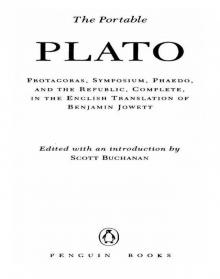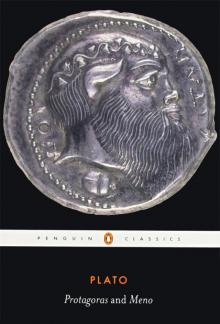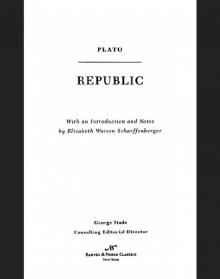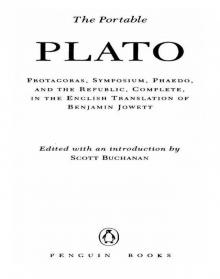The Portable Plato Read online
Page 2
That there is knowledge in poetry is not an original discovery of Plato, nor should it be news to us; practically all the philosophers before Plato wrote in verse, and we still have so-called philosophical poets. But only the mind of a playwright would find both wisdom and poetry in the talk of the ordinary man, and for the proper winning of such wisdom a character like Socrates would have had to be invented if he had not existed.
There are many other lesser poets with whom Plato was familiar, some that he quotes, criticizes, and even makes fun of, but it is the great tragic and comic poets that possess and move his mind. As Homer supplies the raw material of his craft, so Aeschylus, Sophocles, Euripides, and Aristophanes set the aim and the method of the dialogues.
Tragedy has a misty and perhaps a mystical origin. The anthropologists tell a story of prehistoric rituals connected with plant,. animal, and human fertility in which the god Dionysus is killed in the autumn, his flesh scattered on the fields as a kind of divine manure, and he is reborn in the spring as a child. He is both the prototype of the tragic hero and the god to whom sacrifices were made when the imitative plays were performed in the Greek theatrical festivals of Plato’s time. There is some evidence that the plays were popular presentations of both the Orphic and the Eleusinian mysteries, to which only the select few belonged as to rival state churches. There is heavy evidence that they were the canonical forms for theological speculation, in that they were serious attempts, only partially successful, to justify the ways of the gods to men. These may be heavy afterthoughts of modem scholarship to explain the simple spontaneous power that the tragedies still have even for us, but there is no doubt that their effects are not exaggerated in such estimates of their origins. Whether it was religious faith, common opinion, or just wonder at human affairs, the Greek mind found the tragic ordeal an effective purge of mystery and a savior of wonder.
The story or myth ran to a type. A good man is possessed by an idea, a plan, and a purpose. In his steps to carry it out, he becomes entangled in circumstance until there comes a step, difficult and ominous, but necessary if he is to be true to himself. Actually the step contains a destructive contradiction that he does not fully see. He hesitates to take it, but feels and thinks that he can choose no other; it is a choice that is not a choice. The step leads to the failure of his purpose, the crushing of his character, often of his person. But in this catastrophe and calamity he loses the blindness of his resolved action and sees himself and the world in a new light. Plays with such master-plots were written in trilogies in which the first play set the situation for the second and the second for the third, and the three were finally followed by a so-called satyr-play which gave a comic allegorical version of the three preceding episodes. The stories chosen for this treatment were usually familiar legends, though sometimes original constructions. They were reminiscences leading to recognitions.
The most illustrious example of these probing myths is the story of Oedipus, the prehistoric King of Thebes, as it is presented in Sophocles’ play, Oedipus the King. The first recording of the story in writing is in Homer,1 Odysseus reciting:
“And I saw the mother of Oedipodes, fair Epicaste, who wrought the monstrous deed in ignorance of mind, in that she wedded her own son, and he, when he had slain his father, wedded her, and straightway the gods made these things known among men. Howbeit he abode as lord of the Cadmeans in lovely Thebe, suffering woes through the baneful counsels of the gods, but she went down to the house of Hades, the strong warder. She made fast a noose on high from a lofty beam, overpowered by her sorrow, but for him she left behind woes full many, even all that the Avengers of a mother bring to pass.”
This and other things like it are seen by Odysseus as if mirrored in a sacrificial pool of blood when he visits the shades in Hades: a Homeric opinion.
Sophocles makes Oedipus the protagonist and hero and uses the circumstance and sophistication of the folk tradition to focus and magnify the tragic essence of the folk tale. Upon the birth of Oedipus Laius, his father is warned by the Delphic oracle that he will be slain by his son. Oedipus is therefore exposed to die, but the shepherd in charge of the exposure passes him on to the king of Corinth who brings him up as his son. Rumors of his real origin disturb him and he goes to Delphi where he is told that he will kill his father and marry his mother. In horror he avoids Corinth, and on the lonely road to Thebes he quarrels with and kills an old man. On, reaching Thebes he answers the riddle of the Sphinx, who dies in defeat. This brings him to court, where he marries the queen, and becomes king. After they have had four children, there is a plague in Thebes, and the oracle’s word is that there is a pollution in the city causing the plague. Oedipus orders a search and pronounces punishment by exile for the unknown agent of the unknown crime. He conducts the search with passion, honesty, and persistence. Final suspicion of both himself and of his courtiers pushes him to the desperate end in which it is demonstrated that he is the criminal and cause of the pestilence. Jocasta, the queen, mother, and wife, hangs herself; Oedipus, the king, son, and husband, blinds and exiles himself.
Sophocles’ play presents only the final action, the pestilence in the city and the search and discovery of its cause. The plot follows closely the machinery of judicial process, with Oedipus playing the parts of detective, prosecutor, judge, and finally guilty defendant. The tragic plot is complete, the action articulate and detailed. The final insight flows from complete collection and recollection of evidence. Catastrophe, the reversal of roles, and calamity, the destructive consequence, are completely reasoned and willed. The end is purgation of passion and clarification of mystery. The name Oedipus is usually accepted to mean “swollen-foot,” indicating the wound-scar that resulted from the manner of the infant’s exposure and that serves as mark of recognition of personal identity in the play, but it could equally mean “He who learned his roots,” the man who knew himself.
The story in this form presents a thoroughly Greek man who devoted himself to honesty with himself and justice for all, a king of men. There is the persistence and subtlety of Odysseus combined with a passionate acceptance of the burden of civilized justice. Sophocles puts his sure finger on the deep mystery and still deeper contradiction that genuine just government contains. The man sins and knows it and takes responsibility for it at last. One is reminded of the king-plays of Shakespeare where the study of this paradox is encyclopedic.
It is not by chance that Plato in the Apology and the Crito casts Socrates as an Oedipus, a master of life as his name indicates, who reasonably and willingly accepts his condemnation to death. Socrates, the hero-protagonist of the dramatic demonstration of justice in The Republic, uses his own trial, as he has used his whole life, to inquire and to find the answer to the riddle of the Delphic Oracle which had said that he was the wisest man in Greece; has killed his father, the city, by charming the youth away from conventional citizenship to the higher aims of the state; and married his mother, the laws, which have nourished and protected him in his mission. There is a different content in the Platonic riddle of Socrates, and tragedy has worked for a different end on a higher level, but the character and plot are the same. The end of the reminiscence is purgation and insight for all.
Aristotle says that Oedipus the King is the perfect tragedy, and for Aristotle this means that it is the most thorough realization of the potentiality that lies in the tragic pattern. One reason that it is so good is that the story of Oedipus is one of the best stories in the world; it is still fermenting, not only in the Oedipus complex of Freudian psychology, but in the moral patterns that enable the literary artist to see life steadily and whole. As Freud suggests, it is the hidden story of every man, no matter what the degree of sublimity or sublimation its articulation and purgation achieve. Another reason that it is a good tragedy is that Sophocles was a good work man. He had inherited from Aeschylus the dramatic tools for probing mystery and paradox, the notions of necessity, or fate, the hybris or arrogance of men that incurs the jealousy of t
he gods, the strict rigor of plot that binds action and thought into a chain of rational choices by the hero, and the inevitability of catastrophe in the kind of human goodness that learns from experience. Sophocles had turned tragedy into a powerful engine of inquiry which must have heightened the sense of spiritual adventure in every Greek’s mind. Socrates is quoting Sophocles when he says in the Apology that the unexamined life is no life at all for a man. Plato learned most of what he knew about dialectic from Sophocles.
Plato learned a great deal from the other tragic poets. The relation of reason to necessity in Aeschylus’s sea of troubles becomes cosmology in the Timaeus. The diabolic anarchy of man living merely under natural law, as it is presented in the Orestes trilogy, gives tragic power to the account of the rise and fall of civil government in the eighth book of The Republic. But perhaps the most characteristic lesson that Plato learned from these poets was the distinction between natural things in the fleeing shadow of time and the world of unchanging ideas. The tragic hero is the type of all things in nature; he comes into being and he passes away. His career is an embodiment of unchanging qualities, the realization of eternal and therefore incessantly recurring ends and goods. His growth is a blind and perhaps mad transmigration into the world of ideas, and his passage is a fall and a forgetting of the things that prevented understanding. Out of the loss and the suffering, wisdom. It is said that Socrates collaborated with Euripides; if so, Euripides studied the suffering, and Socrates chiseled out the wisdom. The Euripidean plays, as they reflected the religious, moral, and political breakdown of Athens, passed on the tragically worked material of the time to Plato for his new dramaturgy, for which Socrates was needed as the foil.
There is a legend that before Plato met Socrates he was a comic poet, imitating and rivaling Aristophanes in the theater. There is strong historical presumption that this is not the fact, but like most legends about Plato there is light in it for the kind of curiosity that wants to know the ingredients of the dialogues. Plato was certainly a comic poet in the dialogues, and this is true not merely of the surface gaiety and the teasing results, but also of the deep vision into his human and ideal material. No matter how serious and apparently tragic the data are, there always is the penetration of love and irony. These two ubiquitous qualities in the dialogues are the great comic virtues. For the best view of this quality of comedy in Plato, see the speech that Plato has Aristophanes make on love in the Symposium. Aristophanes himself could have done no better, and yet Plato must have hated him for the fatal effects his Clouds had on the life of Socrates. There are signs even where this matter is directly discussed that Plato belongs with Aristophanes to the charmed circle of those who have achieved comic wisdom. The ironist is understood best when he is being misunderstood; he understands misunderstanding. In this comic way Plato and Aristophanes are rival poets.
The purpose or end of tragedy was the purgation of pity and terror, as Aristotle said in his Poetics, not just any pity and terror, but that special blend of the two great passions that accompany heroic action. The hero of Homeric times and of later Greek poetry was the inspired lover of great deeds and fame. His discernment of the necessity of great deeds and the virtues that gave him courage to face them were evidence of divinity in the man, and the moment of decision, when the hero plunged into a “sea of troubles,” was the high point of tragic narrative. The Greeks had a word for it —hybris. It names a quality of pride, arrogance, defiance, and madness, and the resulting great deeds were admired, feared, and pitied because they obviously incurred the jealousy of the gods. Audiences sat transfixed by the stubborn blindness and the fateful irony of the hero’s inevitable choice. The hero’s equally courageous and willing acceptance of reversal, of calamity, and of the judgment of gods and fate, that events seemed to pronounce, purged and enlightened both hero and audience. Such dramatic instruction was the invigorating education of the Greeks. After a century of such education they were ready for the advanced studies that comedy provided. In Aristophanes another Muse is managing the stage.
It is as if the tragic hero had split into two persons. In a tragedy he was both protagonist and antagonist; he gave himself wholly to his vision, and then at the height of his blind commitment had to accept destructive and transforming light. In comedy this agony is carried by two persons, the hero and the villain, often with the aid of seconds. The heavy darkness of tragedy gives way to lightness and light, and the machinery of the mystery works and plays before all eyes. This is not to say that the burden of pity, fear, and sin is dumped, but rather that laughter and tears are added to it. The magic by which this takes place is the sophistication which tragedy has made possible. In place of the blind pride of the demigod-hero, there is pretense, ironic pretense on the part of the hero, and mischievous or diabolic pretense on the part of the villain or villains. The two pretenses brought together in the action accomplish a purgation, sometimes with more thoroughness and light than in any tragedy.
Aristophanes discovered the full range of pretense and, in a variety of roles, filled his stage with impostors: the bragging soldier, the learned or pedantic doctor, the magician cook, the flattering parasite, the aged politician, the retired business man, the foolishly wise young man, the lascivious old woman, and the treacherous slave. Most of these claim to know or to do more than they are able, but one, and sometimes more, claims to know less and do less than he actually does. This is the comic mixture, buffoonery and irony lighting and burning each other up.
There is the theory that comedy arises from the same rites of fertility for man, beast, and crop from which tragedy arises. It is supposed that a god is born, dies, and is resurrected. There is a mother at the birth, a bride at the resurrection, and a struggle with an antagonist at the death, perhaps a medicine-man at both death and resurrection, and these explain the categories of impostorship. There is the theory that the ritual in this case is concerned with the exorcism of devils. Be this as it may, it does not in itself determine the depth and brilliance of the ordeal by laughter, which can reach down to slapstick or up to theology.
As tragedy seems to have to move on high ground with creatures like men occasionally being transfigured into deities, as the closing episodes of the trilogies sometimes show them, comedy seems to have complete freedom of situation, material, and style. It is, for instance, very easy to turn a tragedy into a comedy; delivery in a slightly mocking tone of voice can do it with even the best specimens. Inspired madness seems to have a quick affinity with bombast, as the schoolboy translator of Aeschylus well knows. There are consequently comic parodies of tragedies and melodramas. But there can be vulgar comedies dealing in pornography and petty violence, backyard quarrels between housewives, intrigue between gossipy old men, satires on historical and current heroes, battles of giants and political ideologies such as we have today without a much-needed author. This range of versatility, set beside the rather narrow dignity of tragedy, should not confuse us; their dramatic ends are the same, and their successes mutually dependent. Tragedy impregnates and delivers; comedy lets the brood of offspring live.
The level on which a comedy moves is determined essentially by the powers that can be planted in the hero. To his audience he must appear part fool; in himself he must have either the confidence of a very energetic ignorance, or great restraint in the exercise of his intelligence. Simple naivete and omnivorous curiosity make the best ironic buffoon. The hero undertakes some trivial or commonplace project, is beset by imposture and illusion. By irony, or inquiry, as the Greek word eironeia indicates, he moves or transforms the illusions progressively until they disappear. Either curiosity or wit will accomplish the puncture. Magic or just imagination may suffice, and laughter is the sign of success. The original project may never be accomplished, or others may successively or endlessly take its place, but the pure gold of comic wisdom and charity precipitates almost unnoticed. There is a tradition of folk comedy that is said to keep us sane. It has familiar figures in it, such as Punch and Judy, Pu
lcinella, Pierrot, Harlequin, and Domino, the clowns in the circus, the faces on playing cards, and the now stock figures of Hollywood movies. We attend the sideshows at country fairs, go to the circus and opera, play bridge, and do our daily comics or our weekly movies, not because we are patrons of the arts but because we need the shadowy repetition of the ancient ritual to renew our lives.

 The Portable Plato - Protagoras Symposium Phaedo The Republic
The Portable Plato - Protagoras Symposium Phaedo The Republic Protagoras and Meno
Protagoras and Meno Republic (Barnes & Noble Classics Series)
Republic (Barnes & Noble Classics Series) The Last Days of Socrates
The Last Days of Socrates The Portable Plato
The Portable Plato